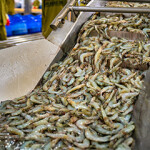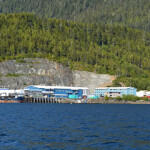Coastal China city aims to grab tuna resources
One of China’s leading seafood processing hubs is aiming to rank among the world’s leading processors of tuna, with the help of government subsidies and government-assisted tuna supply deals with Papa New Guinea and Indonesia. Officials in Zhoushan, a coastal city south of Shanghai, say they want to shift from squid to tuna processing. They’re hoping to increase tuna processing capacity and exports by helping processors build new canning facilities and supporting local fishing fleets to secure more overseas tuna.
The city’s government is helping 11 tuna-processing companies in Zhoushan, build their annual capacity from 110,000 tons to 150,000 tons. But a bottleneck in sourcing tuna is limiting potential, explained Chen Bin, an official with the foreign trade section of the city’s Ocean and Fisheries Bureau.
“Right now there are only 29 fishing boats for tuna-processing in Zhoushan and they belong to five different companies. We need more scale…besides, our annual import figure of tuna is less than 300,000 tons. We have really been impacted by the restrictions on fishing in other seas,” he said.
Formerly concentrated on squid processing, Zhoushan exported 129,000 tons of mostly semi-processed “tuna-related” products in the first quarter of this year, worth USD 530,000 (EUR 411,098). Chen says leading markets include Thailand, Spain and Israel. Firms in the city also ship to Latin America and Africa.
Tuna consumption is growing in China thanks to the use of tuna in convenience foods and sushi. But Zhoushan’s ambitions seem more export-oriented and the city appears determined to mimic the success of nearby Ningbo, also a tuna processing zone, by locating more value-added processing of tuna in the city. Shipments of (mostly canned) tuna from Ningbo in 2012 reached 22,300 tons, “…and the total foreign exchange earnings reached USD 117.6 million (EUR 91.2 million)…making it the city's only commodity export worth over USD 100 million (EUR 77.6 million),” reported the Zhoushan Ri Bao, a daily newspaper controlled by the city’s government.
The newspaper stressed Zhoushan’s need to invest in tuna canning facilities. “In Zhoushan only the Hailisheng Group is equipped with production lines can produce canned tuna directly…other aquatic companies can only produce semi-finished tuna-related products and then have them canned overseas, which makes that most of the profit goes to foreign companies.”
A shortage of resources has pushed tuna prices beyond the reach of smaller processing firms in Zhoushan, explained Chen. He hinted that the city’s government will help smaller firms — dependent on imports — acquire their own boats or source tuna from abroad at better prices.
Chen points to the success of local firms in sourcing tuna overseas. Zhoushan-based Hailisheng Group has a deal with the government of Papua New Guinea, for tuna quota used through Zhoushan Hailisheng Pelagic Fishing Co., Ltd with partners from Taiwan: the firm’s USD 25 million (EUR 19.4 million) tuna processing plant will process 300 metric tons of fish a day, puts it on a par with key tuna players like Philippine-based Century Canning Corp and the Thailand-based Thai Union Corp, both of whom have tuna processing operations in Lae city, Papua New Guinea’s industrial center. Tuna processing has been criticized by some Papuans for low pay and poor environmental conditions.
Chen also blamed a reduction in demand from key western markets as a challenge for local tuna canneries. But he said the Zhoushan government is trying to help those companies to expand their business.
“We are trying to help improve the whole industry from the import raw materials to better advertisements and packaging… we also want to improve the quality of Zhoushan’s tuna products.”
Speaking with his Papua New Guinea counterparts recently Liu Xiaobing, head of international cooperation at the China Fisheries Bureau, noted Papua and its neighbors had the world’s largest tuna resources. Liu said China as the world’s leader in vessel numbers and aquaculture output could offer training and expertise as well as investment to Papua New Guinea. As well as Hailisheng, Shanghai Kaichuan Fishing Company has invested USD 10 million (EUR 7.8 million) on a tuna processing plant. The Chinese Government also provided as grant aid to the Government of Papua New Guinea, a frozen tuna processing facility in Lae, run by a local firm. China also has assisted in financing infrastructure in Papua New Guinea, putting up funds for the Pacific Marine Industrial Zone.
While Zhoushan appears focused on exports others have been looking to the potential of domestic tuna sales in China: Korea’s Dongwon F&B this year signed a partnership deal with Shanghai-based, state-owned Bright Food Group to enter the Chinese canned tuna market.






Share